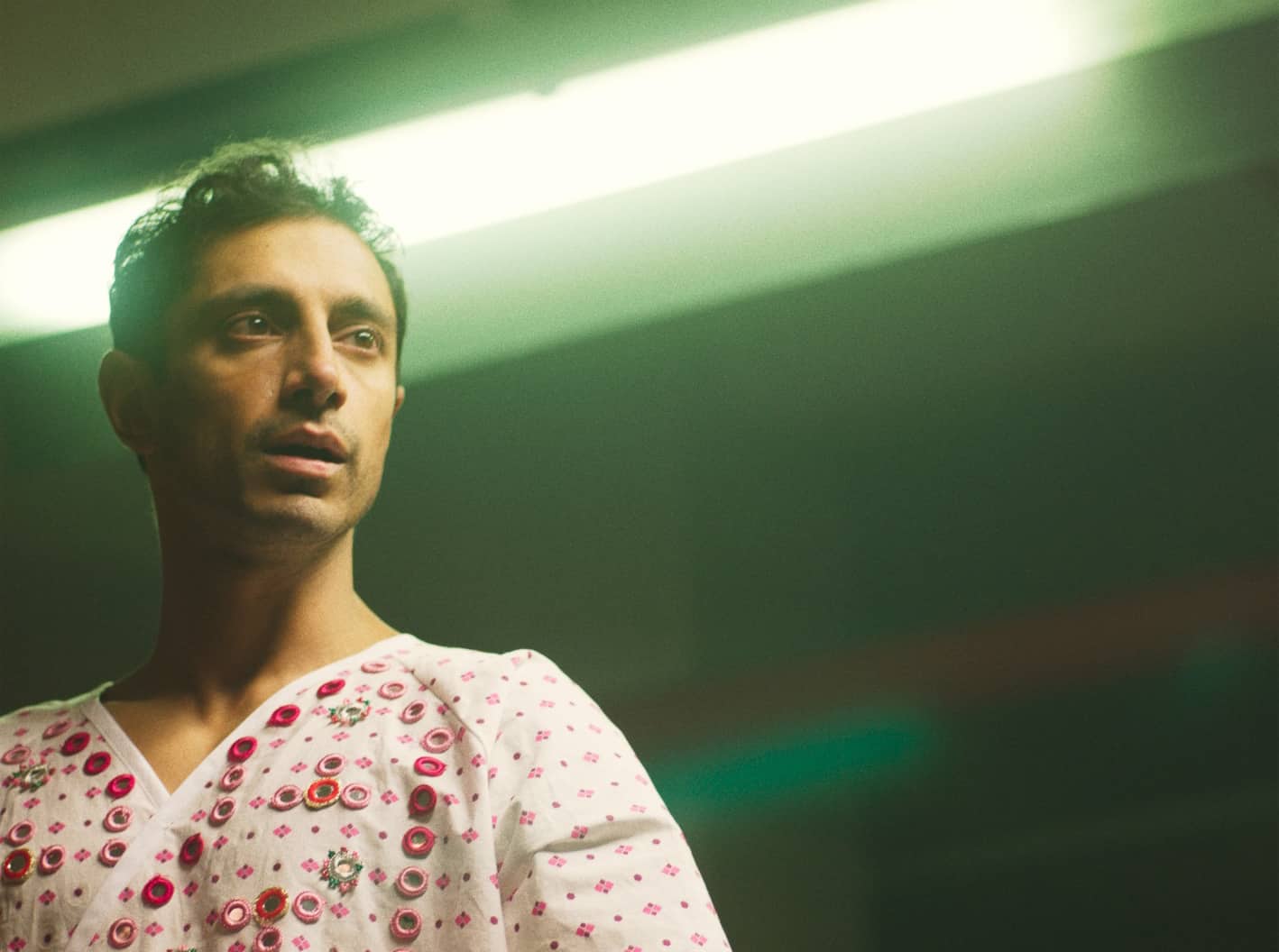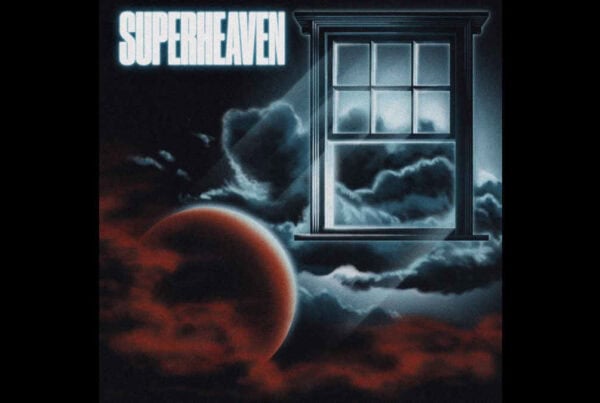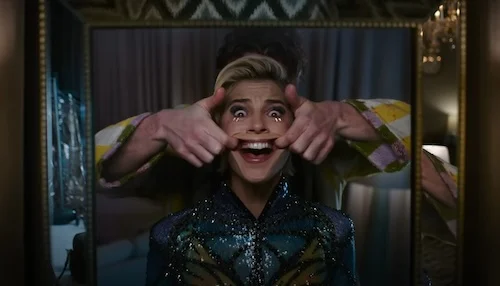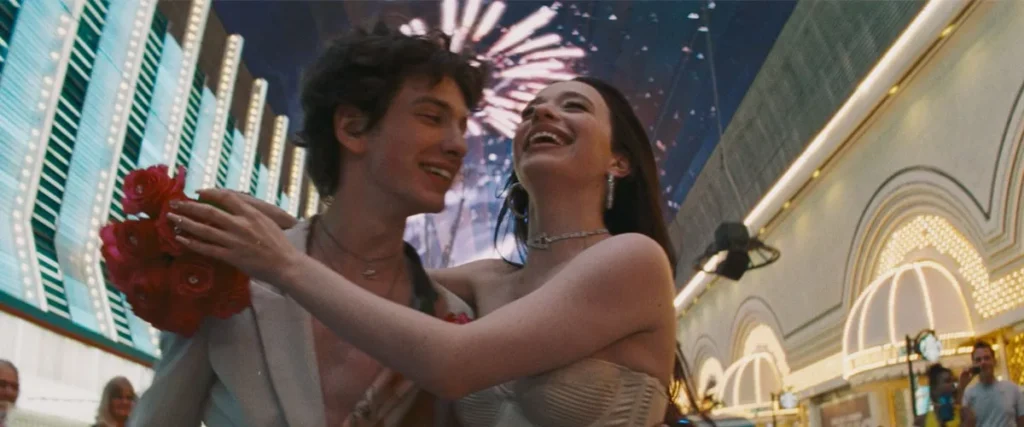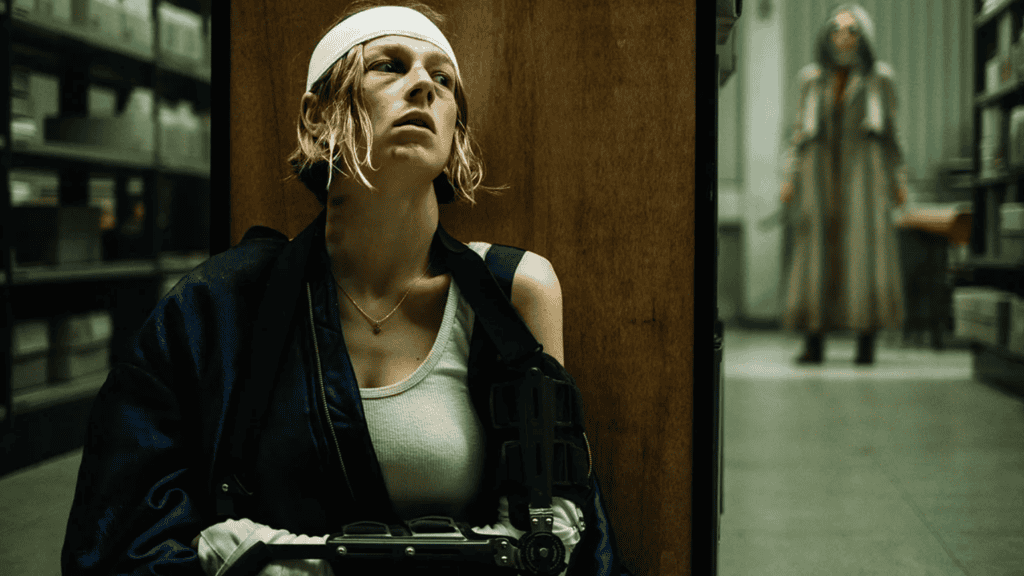Disclaimer: this review was made possible thanks to a screener provided by the film’s UK distributor, BFI Distribution.
Mogul Mowgli, the narrative feature debut by director Bassam Tariq, partly shares its name with an album track from writer-star Riz Ahmed’s criminally underappreciated album as part of Swet Shop Boys, “Half Moghul, Half Mowgli.” On the track, Riz raps with tumult, frustration and discontent about the dichotomy he struggles with in his sense of self. An actor and rapper forever on the verge of finally breaking through, but constantly at risk of having to sell out his culture and heritage in order to do so. Being attacked on all sides for daring to be outspoken and desiring fame as an artist, by racists sickened from his mere presence and by members of his own community for going against ‘traditional’ Pakistani and Muslim values in his art (some of that likely ingrained in Riz’s status as the son of first-generation immigrants). Imposter syndrome as to whether he even deserves to be operating on the near-breakthrough level that he is on account of rap traditionally being the culture of Black people rather than Pakistanis.
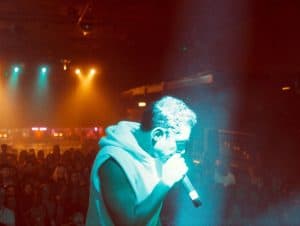
Riz Ahmed as Zed in MOGUL MOWGLI © Rob Youngson – Pulse Films & BBC
These questions, these complex existential and internal traumas which have been a part of Riz’s art ever since he first commanded attention 14 years ago with “Post 9/11 Blues,” have now been documented on feature film with Mogul Mowgli, a deeply personal (though not autobiographical) collaboration with documentary filmmaker Tariq. Riz plays Zed, a British-Pakistani rapper currently based in New York who is finally, after more than a decade of grinding, on the verge of crossing over into the big time, having just booked the opening slot on a European tour with a famous rapper. But Zed is troubled. His relationship with his girlfriend Bina (Aiysha Hart) crumbles to dust within the film’s first 10 minutes. He returns back to London pre-tour to see the family he hasn’t visited in two years: a stern father (Alyy Khan) with no interest in his son’s art who keeps casually but icily putting down Zed’s every achievement, a supportive but overworked and deeply traditional mother (Sudha Bhuchar), a largely confrontational sibling (Hussain Manawer) accusing Zed of betraying his culture. He feels disconnected geographically, culturally, spiritually. Then, a week before his tour is scheduled to commence, Zed is struck down with a degenerative autoimmune disease that threatens to rip away his entire sense of self for good.
If you were to happen upon Mogul Mowgli without any prior context as to what it’s about or the kinds of evergreen-relevant subjects and themes that Tariq and Ahmed have been mining in their art beforehand, then the austere 4:3 framing that cinematographer Annika Summerson shoots proceedings in should immediately prime you from the jump that this wants to be a challenging film. Tariq and Ahmed’s screenplay is an ambitious, rough, and occasionally bitter thing; equally a polemic as often as it is a narrative or a specific character study. Much like Zed, Tariq and Ahmed’s minds are discontent, with the sources of such being widespread and interlocked, born just as much from deeply internalised self-hatred as outside circumstances. Many a scene is framed off-centre, Zed’s body or mouth especially, with lots of negative space designed to communicate how disassociated he feels from any non-stage surroundings whilst close-ups linger on the failing weakness of his muscles and crushing isolation of his mind.
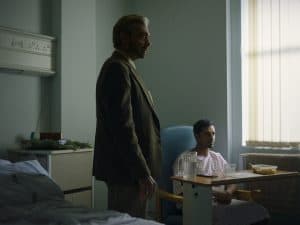
Alyy Khan as Bashir and Riz Ahmed as Zed in MOGUL MOWGLI © Rob Youngson – Pulse Films & BBC
As much as all of this sounds like it fits within British indie cinema’s lineage of kitchen sink dramas – although you can still find elements of that in the extremely prickly dialogue shared between Zed and his family members – Tariq just as often disappears into a surrealist dream logic. Past traumas bleed their way into Zed’s current reality, often unexplained though still decipherable to those not versed in Pakistani culture, as reminders of the pain his anger is failing to properly process. Briefly glimpsed images of his father as a child hiding in the dank car of a freight train whilst escaping from India, Zed being constantly tormented by a large man with flowers over his head, a seeming flashback to an early rap battle which turns ugly when Zed fights back due to attacks on his race. I’m reminded a fair bit of how Lynne Ramsey’s You Were Never Really Here also operated in a rather oppressive dream logic depiction of its protagonist’s tortured mental state, albeit still structurally tied to a more accessible and less abstract version of this story. (Fittingly, both films share a sound designer.)
The effects are hypnotic and purposefully tiring to witness, particularly since Zed is quite prone to self-destruction and bursts of impotent rage which are truthful yet no less uncomfortable. The tangible specificity and bleeding of personal experiences and feelings of Ahmed & Tariq breathes life into what could otherwise, despite the more surrealist depiction of the material, come off as bog-standard and somewhat underdeveloped character beats. Stern disapproving fathers are a dime a dozen in stories like these, but the barely passive-aggressive venom Zed and his father share – the result less of malice than a complete communication breakdown neither man knows how to truly resolve – paints a sufficient enough picture by itself.
A subplot involving Zed’s embittered reactions to a rising young British-Pakistani rapper called RPG (Nabhaan Rizwan) who, unlike Zed, almost exclusively raps about empty materialism risks coming off as ‘old-ish man yells at lawn-occupying kids,’ particularly since this is where the film’s few jokes reside. But Tariq & Ahmed do touch upon a very valid and thorny question with how Zed is repeatedly told that he should be happy for RPG’s success, including most likely taking Zed’s tour slot, because it means “the culture” Zed has been fighting on behalf of his whole career gets more attention in the mainstream, and his difficulty squaring that fact with both his own opinions of the guy’s music and the natural jealousy from seeing someone achieve success you had to scratch and claw for with seemingly little effort on their part.
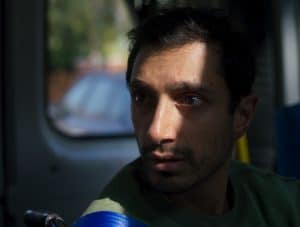
Riz Ahmed as Zed in MOGUL MOWGLI © Rob Youngson – Pulse Films & BBC
Perhaps unsurprisingly, Ahmed is fantastic in this. He’s a man with undeniable charisma and screen presence that, whilst he’s been great in many roles on film, both the Hollywood and British film industries have been unable (or unwilling) to figure out how to properly utilise. With Mogul Mowgli, working with a script of his own and with a director/co-writer clearly determined to best communicate his strengths as an actor, Ahmed finally gets a chance to bring that earnest intensity he magnetically displayed throughout The Night Of into the realm of film. He leaves it all on the screen, albeit without ever slipping into over-acting, with such a soulful and frustrated performance that’s commanding to witness and gutting at the times when Zed’s bile and pain spills out on those around him. The supporting cast all make good impressions with what material they have, but the film’s specific focus on the character of Zed means that it’s all dependent on Ahmed and at times it really does feel like he’s exorcising something through his performance here. And that’s before the times where the film pauses for Zed to communicate those feelings through rap which are electric to witness – and also are shared with Riz’s album from earlier this year, The Long Goodbye, which illuminates how both projects were clearly conceptualised at the same time.
If there’s one reason why, despite all of this praise, I am somewhat hesitant to fully hold Mogul Mowgli up as one of the year’s best films, though, it’s that Tariq and Ahmed struggle to stick the landing. Whether it be because their ambition outstretched their resources (common in low-budget first-timer indie projects), or maybe because they got detrimentally noted by producers come the end, or maybe they simply ran out of time/money, the fact remains that I found the film’s resolution to be rather abrupt and disappointingly straightforward. When so much of the rest of the film works on surrealism and confrontational ugliness, residing in the spaces where trauma and baggage are too deep-seated to find a sense of healthy progression and closure without serious work, it’s disappointing to see the last five minutes resolve so cleanly and suddenly. I get why on a metaphorical and representational level, but in terms of narrative unfolding on-screen I felt like a few steps and vital scenes had been skipped over for a concession towards the more straightforward and commercially-acceptable version of this kind of story.
It means that the immediate sensation when the house lights come up is one of mild deflation, when you see something otherwise so clearly set for greatness mildly bottle it at the last corner. Mogul Mowgli is otherwise a really strong and very effective narrative debut feature for Bassam Tariq, one that shows a director with the capability of being a challenging and unique voice in the world of film if given the means and free reign to go all in on his voice. For so much of its runtime, the film is truly engrossing to watch, at times achieving a deliberate uncomfortableness akin to eavesdropping on someone else’s therapy session, and Riz Ahmed continues to be one of our most vital and skilful artists as both writer and performer. Even if the film can’t quite finish on the best of its feet, it was nice to finally see something new in 2020 that manages to cut through the numbing horror of *points to everything going on* and totally command both my attention and emotions for as long as Mogul Mowgli does.
Mogul Mowgli is available to rent on BFI Player and Curzon Home Cinema from today. A special live virtual cinema event, Mogul Mowgli LIVE, with exclusive additional content and interactivity will be held on 18th November. Tariq and Ahmed have also curated a season of films that inspired their work called Near the Jugular which are available on BFI Player until 30th November.

